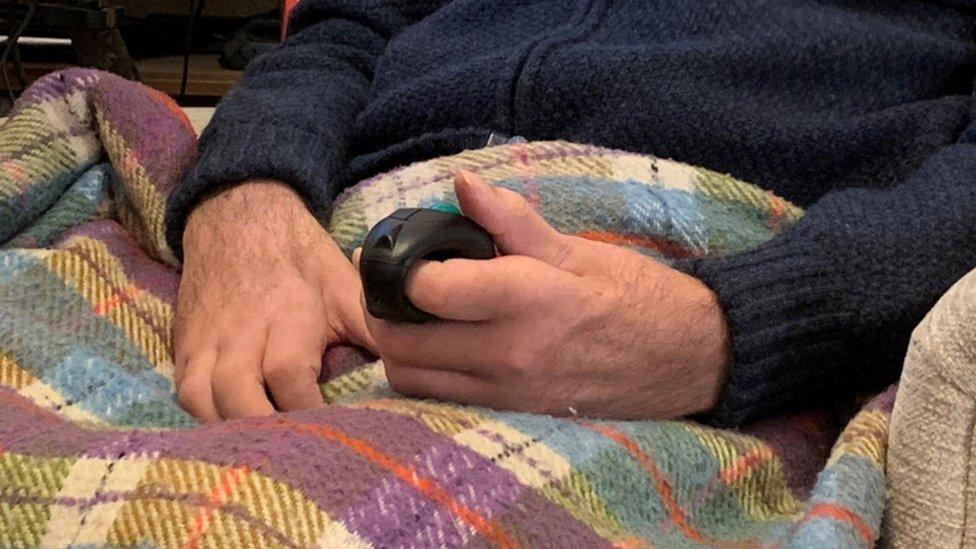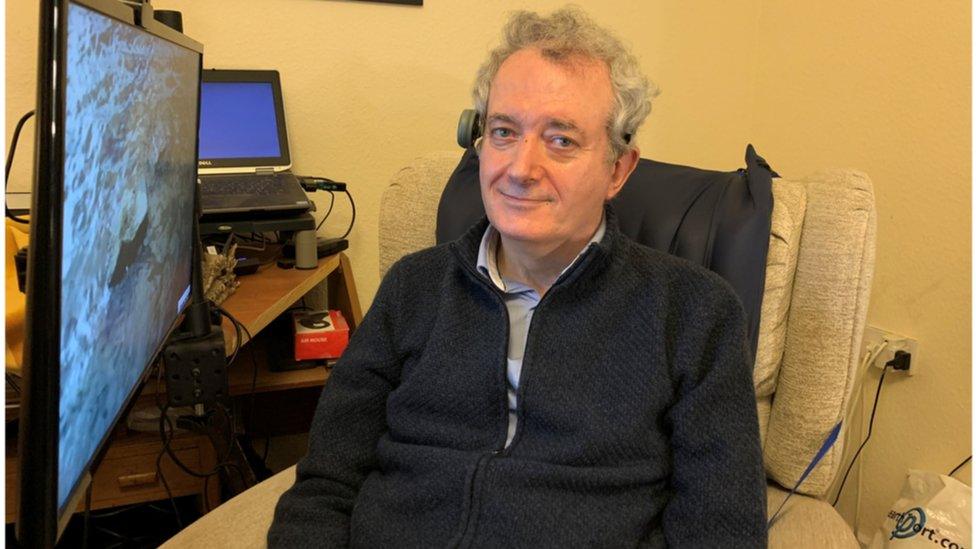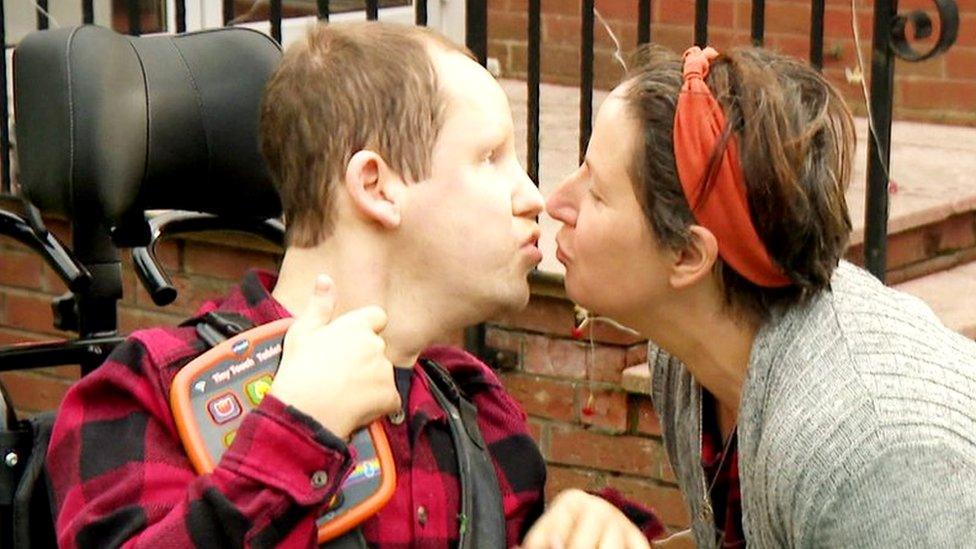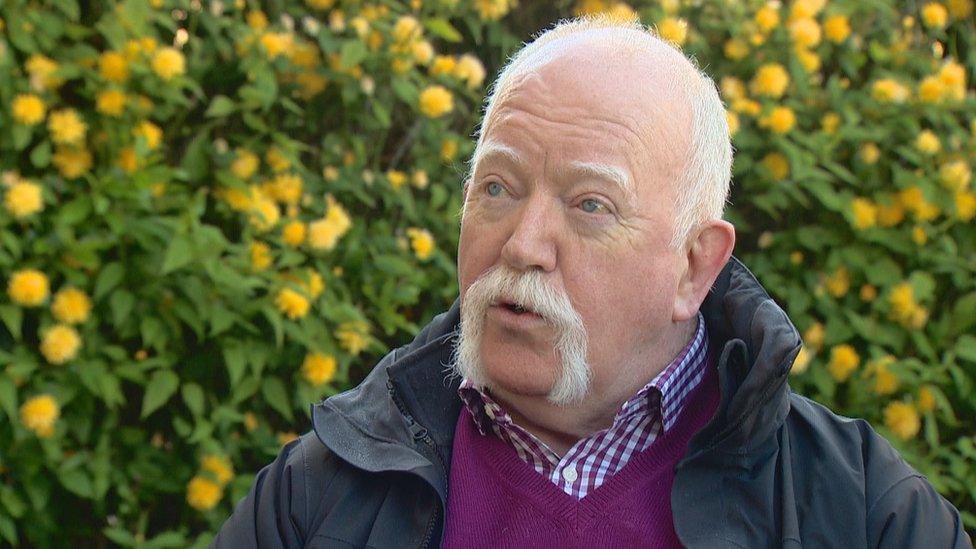Thousands miss out on care due to staff shortages
- Published

Some people with serious disabilities and terminal illnesses have already lost their carers
Thousands of people with complex needs have been told their care may not be fully met because of staff shortages.
A number of areas, including Fife, Argyll and Bute and the Lothians, have sent letters saying they may have to amend existing care packages.
Some people with serious disabilities and terminal illnesses have already lost their carers.
The Scottish government said it was working hard to help with recruitment in the sector.
It said Covid and the loss of EU workers because of Brexit had caused staffing shortages and it called on the UK government to give visas to allow people to come back to work in the social care service.
Scotland's health and social care partnerships (HSCPs) have described the challenges of increased demand and staffing shortages as "unprecedented".
The letter from Argyll and Bute Health and Social Care Partnership (HSCP), seen by the BBC, said there may be changes to individual care plans in the coming weeks because of the "national" issue of recruitment problems.
It asks people to contact friends and family for "support with your care needs" at this "challenging time".
Donald MacAskill, of Scottish Care, which represents the independent care sector, said the country was in the midst of a "national social care crisis" which needed to be dealt with urgently before the worst pressures of winter.
He said the crisis would create a huge additional burden for the NHS because people could not be released from hospital without care-at-home packages.
"I know of no area that is not affected by workforce problems," Dr Macaskill said. "These are challenges facing every area of Scotland."

'I am totally at the mercy of those around me'

Geoffrey Alexander was living an independent life before he developed motor neurone disease
Geoffrey Alexander has motor neurone disease (MND) and requires help for everything.
His mobility is so affected he doesn't have the strength to turn on his mobile phone.
A year ago, the 66-year-old was living an independent life. He could walk and take care of himself.
Today he can tweak just one finger and thumb. He can move his eyes and speak.
His siblings stay with him and until the start of this month he had two carers four times a day to get him up, dressed and fed.
Then on Monday, 4 October he received a call from his care providers to say they could provide no care for him beyond the end of the week because of staff shortages.
He says social work in Edinburgh were able to find him a temporary place in a care home.
At his specially-adapted flat in Edinburgh, sourced by the charity MND Scotland, he had been able to listen to music, work on his writing and videos, send emails and spend time with family and friends.
Look at the wall
In the care home he says he can only sit and "contemplate" and look at the wall.
"I am totally at the mercy of those around me," he says.
"I can move my hand a little. I can sometimes squeeze a mouse button. But if I need to move my feet I have to ask someone to move them for me."
He says he has already deteriorated physically in his three weeks in the care home and is worried that he still has no long-term solution.
Geoffrey's care-at-home was provided by independent operator Time for You Care, on behalf of Edinburgh Health and Social Care Partnership.
It said that if staffing challenges meant it could not provide its usual standard of care, it would always work to offer an alternative.
TFY Care said it was paid higher wages than most care companies but it was still losing staff to other jobs such as delivery driving and supermarkets.
A spokeswoman from the Edinburgh Health and Social Care Partnership (HSCP) said care-at-home providers right across Scotland were facing an "acutely difficult time" and the gaps in some areas were significant.
She said there was an urgent recruitment drive for new carers but in the meantime they were working with families to identify "alternative short-term options".
She apologised to people affected and said a return to preferred support arrangements would be reinstated "at the earliest possible opportunity".

Care package at home
The letters from health and social care partnerships explained that staff shortages both within their organisations and with independent providers meant it was not possible to provide care.
Scottish Labour's social affairs spokeswoman Jackie Baillie said the letters were "really troubling for carers" as they talked about removing some, or all, of their care package.
"That puts the burden on hard-pressed families who have been there throughout the pandemic for their loved ones," she said.
The Labour MSP said the latest increase in the minimum wage to £10.02 an hour for care staff was "insufficient" and did not value them properly.
"I am meeting carers who are telling me they can get paid more on the supermarket checkout at Lidl or in the local pub," Ms Baillie said.
"We are arguing for £15 an hour for social care workers in Scotland."
The social care crisis is expected to worsen this winter.
'Very challenging times'
The Scottish government is working on plans to reduce delayed discharge from hospital but care providers said that would not be possible as they could not provide care packages at home.
Argyll and Bute Health and Social Care Partnership (HSCP) said it was experiencing increased demand for care-at-home as well as recruitment difficulties.
It said it was working to provide the best care it could in "these very challenging times".
Lynne Garvey, from Fife HSCP, said Covid-19 was continuing to have an impact and the demand for care-at-home packages was "unprecedented".
Ms Garvey said the partnership was recruiting 40 new carers and looking to attract more home carers.

Social Care Minister Kevin Stewart said Brexit had been a major factor in staffing shortages
Social Care Minister Kevin Stewart said the Scottish government was doing what it could to help health and social care partnerships to recruit and retain staff.
He said factors such as Covid and Brexit had created staffing problems in the sector.
"One care home company I spoke to the other week had lost 40% of their staff because of Brexit and folk returning to their home countries," the minister said.
He said the Scottish government had been in conversation with the UK government about giving visas to allow people to come back to work in the social care service.
Mr Stewart said the UK government was being "rather uncooperative".
The minister said social care workers were seeing their minimum wage raised to £10.02 an hour as part of a £300m package of investments in health services announced at the start of the month.
- Published27 October 2021

- Published21 October 2021

- Published1 October 2021

- Published30 April 2020
